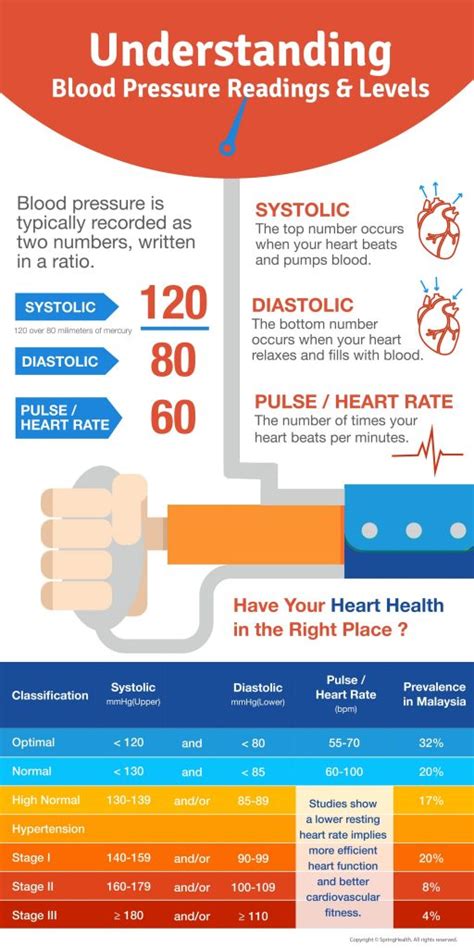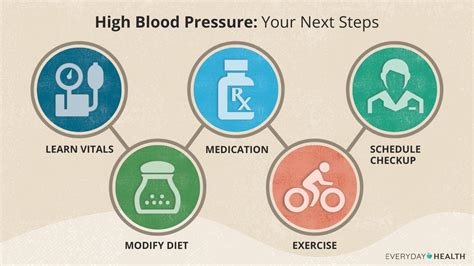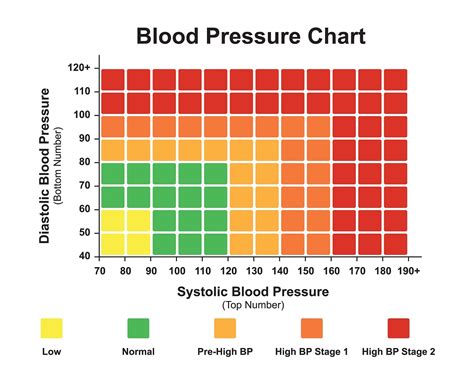Intro
Discover 5 ways to maintain normal blood pressure, including healthy lifestyle habits, stress management, and dietary changes, to reduce hypertension risks and promote overall cardiovascular health and wellness.
Maintaining normal blood pressure is crucial for overall health and well-being. High blood pressure, also known as hypertension, can lead to serious health complications such as heart disease, stroke, and kidney disease. On the other hand, low blood pressure can cause dizziness, fainting, and inadequate blood flow to vital organs. In this article, we will explore the importance of normal blood pressure and provide tips on how to maintain it.
Normal blood pressure is typically defined as a systolic pressure of less than 120 mmHg and a diastolic pressure of less than 80 mmHg. Maintaining normal blood pressure requires a combination of healthy lifestyle habits, a balanced diet, and regular exercise. It is also important to monitor blood pressure regularly to detect any changes or abnormalities early on. By taking proactive steps to maintain normal blood pressure, individuals can reduce their risk of developing cardiovascular disease and other health complications.
Maintaining normal blood pressure is a long-term commitment that requires dedication and perseverance. It involves making healthy lifestyle choices, such as eating a balanced diet, engaging in regular physical activity, and managing stress. Additionally, individuals with a family history of hypertension or other cardiovascular diseases should be extra vigilant in maintaining normal blood pressure. By working together with healthcare professionals and making informed lifestyle choices, individuals can maintain normal blood pressure and reduce their risk of developing serious health complications.
Understanding Blood Pressure

Factors That Affect Blood Pressure
Several factors can affect blood pressure, including age, family history, diet, physical activity level, and stress. As individuals age, their blood pressure tends to increase, making it essential to monitor blood pressure regularly. A family history of hypertension can also increase an individual's risk of developing high blood pressure. Additionally, a diet high in sodium, saturated fat, and cholesterol can contribute to high blood pressure, while regular physical activity and a balanced diet can help maintain normal blood pressure.Maintaining Normal Blood Pressure

Benefits of Normal Blood Pressure
Maintaining normal blood pressure has numerous benefits, including reducing the risk of cardiovascular disease, stroke, and kidney disease. Normal blood pressure can also improve overall health and well-being, increasing energy levels and reducing the risk of chronic diseases. Additionally, maintaining normal blood pressure can improve cognitive function and reduce the risk of dementia.Lifestyle Changes for Normal Blood Pressure

Monitoring Blood Pressure
Monitoring blood pressure is crucial for maintaining normal blood pressure. Individuals should monitor their blood pressure regularly, ideally at the same time each day, to detect any changes or abnormalities. Additionally, individuals with a family history of hypertension or other cardiovascular diseases should work closely with their healthcare provider to monitor blood pressure and make any necessary lifestyle changes.Managing Stress for Normal Blood Pressure

Importance of Sleep for Normal Blood Pressure
Getting enough sleep is crucial for maintaining normal blood pressure. Sleep helps regulate blood pressure, and inadequate sleep can increase the risk of cardiovascular disease. Here are some tips to help improve sleep: * Establish a consistent sleep schedule, aiming for 7-8 hours per night * Create a relaxing bedtime routine, such as reading or taking a warm bath * Avoid caffeine and electronics before bedtime * Create a dark, quiet sleep environment to improve sleep qualityNutrition and Normal Blood Pressure

Supplements for Normal Blood Pressure
Certain supplements can help maintain normal blood pressure. Here are some supplements that may be beneficial: * Potassium: This mineral can help lower blood pressure by balancing out the effects of sodium * Calcium: This mineral can help relax blood vessels and improve blood flow * Magnesium: This mineral can help relax blood vessels and improve blood flow * Omega-3 fatty acids: These healthy fats can help reduce inflammation and improve cardiovascular healthConclusion and Next Steps

We invite you to share your thoughts and experiences on maintaining normal blood pressure in the comments section below. What lifestyle changes have you made to improve your blood pressure? What challenges have you faced, and how have you overcome them? Your input can help others who are struggling to maintain normal blood pressure. Additionally, we encourage you to share this article with friends and family who may benefit from the information. Together, we can promote healthy lifestyles and improve overall health and well-being.
What is normal blood pressure?
+Normal blood pressure is typically defined as a systolic pressure of less than 120 mmHg and a diastolic pressure of less than 80 mmHg.
How can I maintain normal blood pressure?
+Maintaining normal blood pressure requires a combination of healthy lifestyle habits, such as eating a balanced diet, engaging in regular physical activity, and managing stress.
What are the benefits of maintaining normal blood pressure?
+Maintaining normal blood pressure can reduce the risk of cardiovascular disease, stroke, and kidney disease, and improve overall health and well-being.
How often should I monitor my blood pressure?
+It is recommended to monitor blood pressure regularly, ideally at the same time each day, to detect any changes or abnormalities early on.
Can lifestyle changes alone maintain normal blood pressure?
+In many cases, lifestyle changes alone can maintain normal blood pressure. However, individuals with a family history of hypertension or other cardiovascular diseases may need to work closely with their healthcare provider to monitor blood pressure and make any necessary lifestyle changes.
